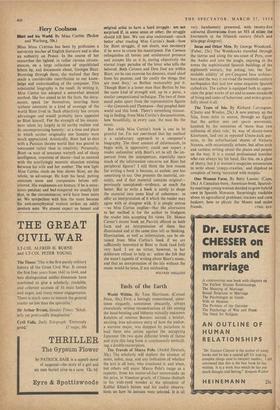Fiery Coolness
MISS MINA CURTISS has been by profession a university teacher of English literature and is also an authority on Proust. In the course of her researches she lighted, in rather curious circum- stances, on a large collection of unpublished letters by, and documents about, Georges Bizet. Browsing through them, she realised that they made a considerable contribution to our know- ledge and understanding of the composer. This substantial biography is the result. In writing it, Miss Curtiss has adopted a somewhat unusual method. She has aimed to let the facts, the docu- ments, speak for themselves, inserting them Ufithout comment in a kind of montage of the world Bizet lived in. Such objectivity has certain advantages and would probably have appealed to Bizet himself. For the strength of his uncom- mon talent lay largely in its earthy realism and its uncompromising honesty : at a time and place in which neither originality nor honesty were much appreciated. Artistically, Bizet had to deal with a Parisian theatre world that was geared to commerce rather than to creativity. Personally, Bizet—a man of sensuous warmth and of sharp intelligence, impatient of shams—had to contend with the scarifyingly neurotic situation existing between his wife and her mother. The new light Miss Curtiss sheds on him shows Bizet, on the whole, to advantage. He kept his head, putting common sense and compassion before self- interest. His weaknesses are human; if he is some- times petulant and bad-tempered we usually feel that, in the circumstances, we'd have been more so. We symisathise with him the more because his anti-metaphysical realism , strikes an oddly modern note. We almost expect an honest and
original artist to have a hard struggle : are not surprised if, in some sense or other, the struggle should kill him. We can also understand—much better after reading Miss Curtiss's book—how for Bizet struggle, if not death, was necessary if he were to create his masterpiece. For Carmen relinquishes all heroic and sentimental pretence and accepts life as it is, stating objectively the eternal tragic paradox of the lover who kills the beloved. Both Carmen and Don Jose are within Bizet; yet he can exorcise his daemons, stand aloof from his passion, and `do coolly the things that are most fiery,' as Berlioz memorably put it. Though Bizet is a lesser man than Berlioz he has the same kind of strength and, up to a point, a similar compositional technique. The two of them stand poles apart from the representative figures —the Gounods and Thomases—that peopled their world and this book. There's something reassur- ing in finding, from Miss Curtiss's documentation, how beautifully, in every case, the man fits the music.
But while Miss Curtiss's book is one to be grateful for, I'm not convinced that her method is a satisfactory approach to a composer's biography. The sheer amount of information, to begin with, is oppressive; could one expect a reader unfamiliar with Bizet's art to sift the im- portant from the unimportant, especially since much of the information concerns not Bizet but peripheral figures? I still think the best reason for writing a book is because, as author, one has something to say. One presents the material, cer- tainly, and if that material contains original— previously unexplored—evidence, so much the better. But to write a book is surely to shape the material into some kind of coherence: to offer an interpretation of it which the reader may agree with or disagree with. It is simply untrue —as Miss Curtiss implies—that the alternative to her method is for the author to bludgeon the reader into accepting his views. Dr. Mosco Carner's recent book on Puccini offered us both facts and an interpretation of them that illuminated and at the same time left us thinking. Illumination, as well as information, can be ob- tained from Miss Curtiss's book if we are sufficiently interested in Bizet to think (and feel) very hard. I see no virtue, however, in her deliberate refusal to help us : unless she felt that she wasn't capable of writing about Bizet's music, and that an interpretation of the life without the music would be lame, if not misleading.
WILFRID MELLERS






































 Previous page
Previous page